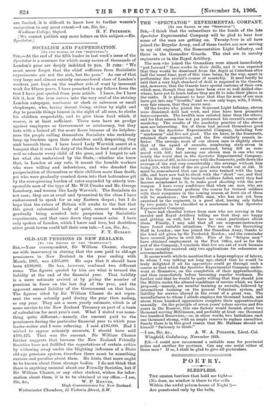THE "SPECTATOR" EXPERIMENTAL COMPANY. [To THZ EDITOR OF THU "SPECTATOR]
SIR,-I think that the subscribers to the funds of the late Spectator Experimental Company will be glad to hear how some of the men are getting on. Twenty-four in all have joined the Regular Army, and of these twelve are now serving in my old regiment, the Somersetshire Light Infantry, and three in the Grenadier Guards. The rest are in cavalry
regiments or in the Royal Artillery.
The men who joined the Grenadiers were almost immediately "put forward" three weeks in their drills, and it was expected that they would be dismissed from the depot at Caterham after half the usual time, part of this time being, by the way, spent in performing the recruit's course of musketry. It need hardly be said that a very high standard of drill is required in the Guards, and, moreover, that the Guards have special customs of their own which men, though they may have been ever so well drilled else- where, have yet to learn before they are fit to take their places in the ranks. It is pleasant to hear that thus far none of our men have got into any "trouble," and we can only hope, with, I think, very fair reason, that they never may. Of the twelve who joined the Somerset Light Infantry, eleven were dismissed drill last week, and nine have been promoted lance-corporals. The twelfth man enlisted later than the others, and for that reason has not yet performed his recruit's course of musketry. The results of the musketry practice of the eleven men are interesting. Six of them had proved themselves good shots in the Spectator Experimental Company, including four "marksmen" and five not good. The six have, in the Somersets, retained their superiority, and the five similarly remain in- ferior. The average score of cur eleven men is slightly above that of the squad of recruits, numbering sixty-seven in all, with which they were exercised, being 608 as com- pared with 502; but among our eleven men is one who was nearly the worst shot in the Spectator Experimental Company, and his score of 397, in his course with the Somersets, pulls down the average of the rest very considerably ; the average without him being 518, while that of the six good shots works out at 548. It must be remembered that our men were trained with the long rifle, and have now had to shoot with the "short" one, and that in the Regular Army the trained soldiers failed, until they had become accustomed to it, to make good shooting with the new weapon. I have every confidence that when our men who are now in the Somersets perform the course for trained soldiers with their companies in the coming season, at least six of them will be marksmen ; the twelfth man, who has not yet been exercised in the regiment, is a good shot, having only failed by two points to be classified as a marksman in the Spectator Experimental Company. I have had cheerful letters from men who are serving in the cavalry and Royal Artillery telling me that they are happy and getting on well, but I have no exact particulars about them. Finally, I may add that all our sergeant-instructors have found suitable situations. Two are on the Recruiting Staff in London ; one has joined the Canadian Army, thanks to the kind aid given by Sir Frederick Borden ; and the remainder have secured places in civil life. Five of the "fatigue men" have obtained employment in the Post Office, and as for the rest of the Company, I conclude that few are out of work because I have recently received only two applications for references or recommendations.
It seems worth while to mention that a large employer of labour, to whom I was talking not long ago, stated that he would be truly delighted if an his apprentices could go through such a course as that which the Spectator Experimental Company under- went at Hounslow, on the completion of their apprenticeships, and thus immediately before becoming regular workmen. He further said that be would be quite willing that they should join the Militia under the altered conditions of service which we have proposed,—namely, six months' training as recruits, followed by intermittent training on the present Volunteer system, and liability for service abroad in the event of a great war. The manufacturer to whom I allude employs ten thousand hands, and about three hundred apprentices complete their apprenticeships annually. On the principle of seven years' colour service and five years in the Reserve, this one factory would furnish about two thousand serving Militiamen, and probably at least one thousand two hundred Reservists,—or, in other words, two battalions, each one thousand strong, with an ample reserve to replace casualties. Surely there is in this good reason that Mr. Haldane should set himself "furiously to think."
—I am, Sir, &c., A. W. A. POLLOCK, Lieut.-CoL
Wingfield, Godalming, November 16th.
could now recommend a suitable man for provincial police and another for postman. Can any one assist either of these men ? If so, I shall be glad to give all particulars.














































 Previous page
Previous page